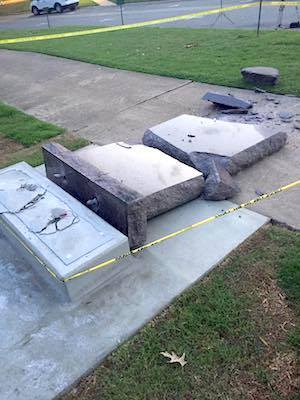The day after a monument depicting the Ten Commandments was installed at the Arkansas State Capitol in Little Rock, Michael T. Reed II drove his 2016 Dodge Dart into the 6-foot-tall (1.8-meter-tall), 6,000 pound (2,721-kilogram) granite slab, shattering it to pieces. Apparently, Reed livestreamed the escapade on Facebook using a video camera inside his car. A man’s voice in the video is heard saying, “Oh my goodness. Freedom!” as the car crashes into the monument.
The Ten Commandments structure was installed with little fanfare and no advanced notice two years after lawmakers approved a measure permitting the privately funded statue on state grounds. Previously, the state Supreme Court decided that the religious display on public property violated the Constitution. However, Republican Senator Jason Rapert, who spearheaded the project, argued that the Capitol grounds were beautiful but lacked a monument honoring the historical, moral foundation of law.
“The Ten Commandments are the basis for most of the laws in civilized nations,” noted Roni Segal, academic adviser for The Israel Institute of Biblical Studies, a company which offers courses on Bible and and Biblical languages, to Breaking Israel News. “It is true that the original Ten Commandments, which appear twice in the Bible, in Exodus 20:1-17 and Deuteronomy 5:1-22, have some religious components like knowing that there is only one God and keeping the Sabbath. In fact, Catholics and Protestants have a bit of a different version, which adds to the challenges of publicizing them.”

For that reason, prominently displaying the Ten Commandments has often been met with contention. In this case, before the monument’s destruction, the American Civil Liberties Union (ACLU) of Arkansas said it would sue in federal court to remove the structure, calling it an “unconstitutional endorsement of religion by the state”. Ironically, The Satanic Temple pushed to erect a statue of the goat-headed deity Baphomet in an effort to show that all beliefs deserve public display. However, the Arkansas legislature thwarted that effort by enacting a law requiring legislative approval before the state commission can consider a monument proposal.
Reed’s act is seen by many as reflecting the sentiments of a growing number of Americans who do not want the Ten Commandments or God, who gave them, in their midst. Yet, it is important to note that, in the Bible, the Ten Commandments are called Aseret ha-D’varim (עֲשֶׂרֶת הַדְּבָרִים) (Exodus 34:28, Deuteronomy 4:13, and Deuteronomy 10:4) and in rabbinical texts, they are referred to as Aseret ha-Dibrot (עשרת הדברות). These phrases accurately translate as “Ten Sayings” or “Ten Statements”, and not “Ten Commandments”, which, in Hebrew, would be Aseret ha-Mitzvot (עשרת המצוות).
“God gave the Jewish people 613 commandments (mitzvot–מצוות) which are all considered equally important, sacred and binding,” continued Segal. “Since people have a limited understanding of the universe and no way of knowing which commandments are more important in the eyes of the Creator than the other, the sages teach that we must not make assumptions as to the importance of any commandment.”
In other words, singling out the Ten Commandments for display may not only cross over the line of separation of church and state but may also cross over the line of God’s desire, which is to perform all of his commandments with equal dedication and not single out any individual one or even ten.
(Non-Jews are only obligated on seven Noahide laws enumerated as follows:
- Do not deny God.
- Do not blaspheme God.
- Do not murder.
- Do not engage in illicit sexual relations.
- Do not steal.
- Do not eat from a live animal.
- Establish courts/legal system to ensure obedience to said laws.)
“Jewish tradition holds that the Ten Commandments encompass all of the 613 commandments in a summarized version,” explained Segal to Breaking Israel News. “For example, do not murder includes not embarrassing someone, which cause the blood to drain from his face as if he has been killed.”
Therefore, since only Jews are obligated to keep 613 commandments, there seems to be many reasons why these should not be displayed in a public forum. As noted by Rita Sklar, executive director of ACLU, “Whatever they may say, the defenders of the Ten Commandments monument, the fact is the text of the Ten Commandments cannot be separated from its religious significance as the text calls individuals to adhere to moral precepts and uniquely religious obligations.”
For many believers, those moral and religious obligations might be viewed as a good thing. But, for people like Reed, it seems clear that public displays of Bible liturgy are seriously problematic.
To learn more about Hebrew and the Bible, please visit here.




